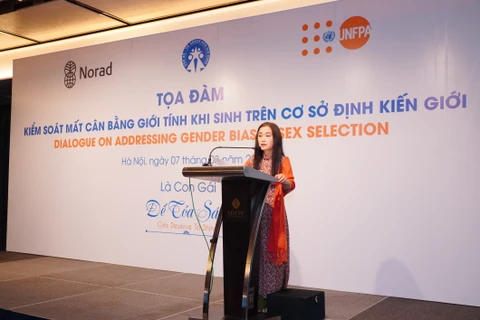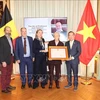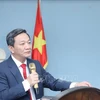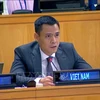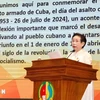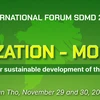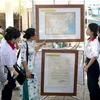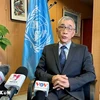Hanoi (VNA) - The Government of Vietnam confirms that the interventions and support from the United Nations Population Fund (UNFPA) in the period of 2017 – 2021 substantially contributed to Vietnam’s efforts to fulfill the transformative promise of “Leaving No One behind” while achieving the Sustainable Development Goals, heard a meeting in Hanoi on March 10.
UNFPA Representative in Vietnam Naomi Kitahara together with Nguyen Thi Dieu Trinh, Deputy Director General of the Foreign Economic Relations Department under the Ministry of Planning and Investment, chaired the meeting to review the achievements recorded in the past five years under the framework of the 9th UNFPA Country Programme for Vietnam.
The meeting also discussed the key intervention areas under the 10th Country Programme for Vietnam for the period of 2022 – 2026, which was approved by the UNFPA Executive Board on February 3 as well as next steps to deliver the new Programme, including the signing of 2022 annual work plans between UNFPA and the partner ministries.
Also present at the meeting were representatives from relevant ministries and state agencies, national institutions, mass/social organisations and partner private sector entities. They included the Ministry of Home Affairs, the Ministry of Health, the Ministry of Labour, Invalids and Social Affairs, the Ministry of Justice, the Ministry of Culture, Sports and Tourism, the General Statistics Office, the Vietnam Farmer’s Union, and the Vietnam Youth Union, among others.
The Ministry of Planning and Investment as the Government coordinating agency confirmed that UNFPA substantially contributed to participatory and evidence-based policy and decision-making for rights-based national laws, policies and programmes for women, young people and the elderly. UNFPA’s interventions also brought into Vietnam international best practice and innovation to prevent and respond to gender-based violence and other harmful practices, which was essential to enable the delivery of multisectoral services and coordination.
Under the framework of the 9th Country Programme and particularly due to the COVID-19 pandemic situation, UNFPA has driven to innovate and try different ways of reaching out to vulnerable groups. Tele-health in SRH was piloted for the first time in Vietnam particularly for ethnic minority regions, and the very first mobile app for the elderly care was introduced. Comprehensive sexuality education for young people was provided for the first time online, and innovative and digital technology was extensively used for the prevention and response to gender-based violence and gender-biased sex selection. The 2019 Population and Housing Census as well as the 2019 National Study on Violence against Women were exceptionally successful in the application of the newest ICT technology to speed up data collection and analysis process and minimize human errors.
UNFPA’s humanitarian support to Vietnam in the past few years was also UNFPA priorities, which focuses on the provision of integrated sexual and reproductive health services, prevention and response to gender-based violence, and support to the elders. Recognising the effect of climate change, and particularly in response to the 2020 floods and downpours of rain in the central part of Vietnam, UNFPA supported mobile outreach to protect the lives of pregnant women and couples who are planning for childbearing. UNFPA made sure that vulnerable population groups were well aware of gender-based violence risks, through digital technologies and the delivery of dignity kits which were done for the very first time in Vietnam.
UNFPA Representative in Vietnam Naomi Kitahara together with Nguyen Thi Dieu Trinh, Deputy Director General of the Foreign Economic Relations Department under the Ministry of Planning and Investment, chaired the meeting to review the achievements recorded in the past five years under the framework of the 9th UNFPA Country Programme for Vietnam.
The meeting also discussed the key intervention areas under the 10th Country Programme for Vietnam for the period of 2022 – 2026, which was approved by the UNFPA Executive Board on February 3 as well as next steps to deliver the new Programme, including the signing of 2022 annual work plans between UNFPA and the partner ministries.
Also present at the meeting were representatives from relevant ministries and state agencies, national institutions, mass/social organisations and partner private sector entities. They included the Ministry of Home Affairs, the Ministry of Health, the Ministry of Labour, Invalids and Social Affairs, the Ministry of Justice, the Ministry of Culture, Sports and Tourism, the General Statistics Office, the Vietnam Farmer’s Union, and the Vietnam Youth Union, among others.
The Ministry of Planning and Investment as the Government coordinating agency confirmed that UNFPA substantially contributed to participatory and evidence-based policy and decision-making for rights-based national laws, policies and programmes for women, young people and the elderly. UNFPA’s interventions also brought into Vietnam international best practice and innovation to prevent and respond to gender-based violence and other harmful practices, which was essential to enable the delivery of multisectoral services and coordination.
Under the framework of the 9th Country Programme and particularly due to the COVID-19 pandemic situation, UNFPA has driven to innovate and try different ways of reaching out to vulnerable groups. Tele-health in SRH was piloted for the first time in Vietnam particularly for ethnic minority regions, and the very first mobile app for the elderly care was introduced. Comprehensive sexuality education for young people was provided for the first time online, and innovative and digital technology was extensively used for the prevention and response to gender-based violence and gender-biased sex selection. The 2019 Population and Housing Census as well as the 2019 National Study on Violence against Women were exceptionally successful in the application of the newest ICT technology to speed up data collection and analysis process and minimize human errors.
UNFPA’s humanitarian support to Vietnam in the past few years was also UNFPA priorities, which focuses on the provision of integrated sexual and reproductive health services, prevention and response to gender-based violence, and support to the elders. Recognising the effect of climate change, and particularly in response to the 2020 floods and downpours of rain in the central part of Vietnam, UNFPA supported mobile outreach to protect the lives of pregnant women and couples who are planning for childbearing. UNFPA made sure that vulnerable population groups were well aware of gender-based violence risks, through digital technologies and the delivery of dignity kits which were done for the very first time in Vietnam.
 The Executive Board of the United Nations Population Fund (UNFPA) recently approved the new 10th country programme for Vietnam in the amount of 26.5 million USD to achieve the sustainable development goals (SDGs) by 2030. (Photo: UNFPA)
The Executive Board of the United Nations Population Fund (UNFPA) recently approved the new 10th country programme for Vietnam in the amount of 26.5 million USD to achieve the sustainable development goals (SDGs) by 2030. (Photo: UNFPA) The Executive Board of the United Nations Population Fund (UNFPA) recently approved the new 10th country programme for Vietnam in the amount of 26.5 million USD to achieve the sustainable development goals (SDGs) by 2030, targeting those at risk of being left behind, including women and girls, adolescents and youth, older persons, ethnic minorities, migrant workers, people with disabilities, and survivors of gender-based violence.
Kitahara expressed her appreciation for the Government’s partnership and collaboration with UNFPA since 1977 and particularly in the past five years. She highlighted some of the key breakthroughs that UNFPA ensured from the implementation of the outgoing programmes/projects. They included the strategic partnerships with both UNFPA traditional donors such as Australian DFAT, KOICA, Norway and Japan, and non-traditional partners including private sector entities such as MSD, Bloomberg and Vital Strategies. UNFPA Vietnam now operates for the implementation of various projects with annual budgets which have increased almost by three times by the end of 2021.
Kitahara stressed: “The 10th Country Programme will aim at achieving the transformative results of the UNFPA’s corporate Strategic Plan, towards Vietnam with Zero preventable maternal death, Zero unmet need for family planning, and Zero gender-based violence and other harmful practices against women and girls. The Programme in the coming five years is in alignment with the United Nations Sustainable Development Cooperation Framework for Vietnam to fulfill the transformative promise of “Leaving no one behind” by directly contributing to two areas: Inclusive Social Development, and Governance and Access to Justice, thus reducing inequalities and vulnerabilities.”
While implementing the 10th Country Programme, UNFPA will continue to partner with the Government, other national institutions in accordance with UNFPA’s comparative advantages and technical competencies, and fully in line with the principles of national ownership and mutual accountability. Under the United Nations Development System (UNDS) reform agenda, UNFPA will contribute to joint initiatives with different United Nations agencies./.
VNA


